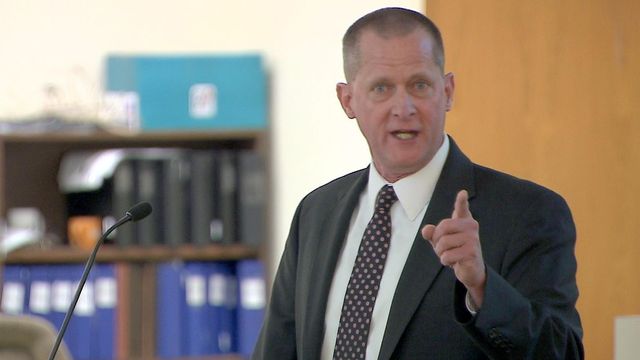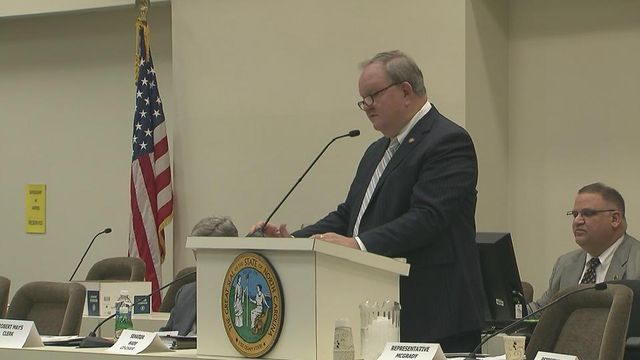DEQ tired of waiting on EPA for coal ash permits
A top state environmental regulator told lawmakers Wednesday his agency is considering issuing permits to remove water from coal ash ponds without federal approval due to long delays by the Environmental Protection Agency.
Posted — UpdatedDepartment of Environmental Quality Assistant Secretary Tom Reeder told the Environmental Review Commission that the federal agency is dragging its feet on everything from civil action against Duke Energy for surface water pollution to approving the federal permits required for Duke to complete dewatering of its four high-risk coal ash ponds, which are required to be excavated and closed by 2019.
North Carolina, like many states, has had authority delegated to it by the EPA to handle federal permitting under the Clean Water Act, but all state-issued CWA permits are subject to approval or disapproval by regional EPA offices.
During a spirited 10 minutes of criticism of the EPA, Reeder complained that the first part of the dewatering process has been held up for more than year by federal inaction on a permit.
"It took EPA 15 months – 15 months! – to figure out the same thing it took one engineer at (the state Division of Water Resources) three hours to figure out," Reeder said.
The permits for the second stage of the dewatering process are in limbo, Reeder said, because of a 2010 federal rule requiring states to count all seeps and leaks from a containment area.
"We’ve been at this for a year and a half now with EPA, and they still can’t tell us how to write a permit that complies with a memo that they put out in 2010," Reeder told the panel angrily. "Again, these are the people that want to tell you how to get electricity in North Carolina and what you can do with ditches on your property."
After referring to "unilateral action," Reeder was asked by Rep. Jimmy Dixon, R-Duplin, to explain what he meant.
"We keep sending permits down to EPA and asking for their approval, and Secretary (Donald) van der Vaart, I know, is considering possibly not waiting for their approval anymore," Reeder answered.
"We trust our scientists. We trust our experts a lot more than we trust anybody down in Atlanta or up in Washington, and if our people tell us that these permits are going to protect the environment, well then, maybe we should just go ahead and issue them and get this show on the road," he said.
Several lawmakers on the panel expressed sympathy with Reeder's frustration over the slow pace of the approval process.
"I would suggest that we move legislation in the short session if we can to break the logjam and get on with solving the darn problem," offered Sen. Rob Rabin, R-Harnett.
While Republican lawmakers and the McCrory administration have long had a contentious relationship with the federal regulatory agency, Mary Maclean Asbill with the Southern Environmental Law Center said that was the first time she's heard talk about openly defying the EPA.
"We are not sure a state agency with delegated authority has ever pulled that," Asbill said, suggesting that, if the DEQ issues permits that the EPA later objects to, any discharge of water by Duke under those invalidated permits would be illegal.
DEQ, she said, could also face a reprimand from the EPA for knowingly allowing an illegal discharge, and the state could lose its permitting authority, which would mean that all permits would have to go through the Atlanta office instead of being handled in Raleigh.
"EPA has already warned DEQ in another context that it is in danger of losing the delegated program, so this would certainly be unwise," Asbill said.
Therese Vick with the Blue Ridge Environmental Defense League agreed, saying such a move could also cost the state federal funding for environmental programs.
"The Environmental Protection Agency is the only oversight that we have over this agency that’s gone rogue," Vick said. "I recognize the importance that things need to be done at these coal ash impoundments, but we need as many sets of eyes on that process as possible."
Neither the EPA nor the Governor's Office responded to request for comment on Reeder's statements.
Late Wednesday DEQ spokesman Mike Rusher insisted in an email that Reeder wasn't implying the state should defy the government.
"DEQ would never issue a permit that is in violation of the Clean Water Act," Rusher wrote. "We only issue permits consistent with the law."
"DEQ is waiting for approval from the EPA and not a 'no comment' on these permits," Rusher said. "DEQ may issue the permit if EPA does not object by not offering comment."
"If DEQ is faced with a choice between protecting the environment or the federal bureaucracy, protecting the environment will win every time," he wrote.
Related Topics
• Credits
Copyright 2024 by Capitol Broadcasting Company. All rights reserved. This material may not be published, broadcast, rewritten or redistributed.






